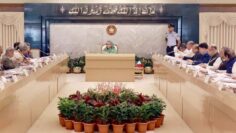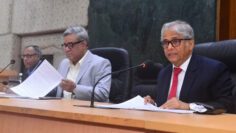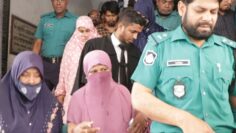Bangladesh security forces enjoy widespread impunity for abuses: US
PBC News: The US Department of State has said that there were reports of widespread impunity for abuses and corruption by the Bangladeshi security forces — encompassing the military, national police, border guards, and counterterrorism units such as the Rapid Action Battalion (RAB).
“The [Bangladesh] government took few measures to investigate and prosecute cases of corruption and abuse and killing by security forces,” read the 2021 Country Reports on Human Rights Practices: Bangladesh – launched by US Secretary of State Antony Blinken on Monday (April 12).
According to the findings of the report, the significant human rights issues in Bangladesh include – credible reports of unlawful or arbitrary killings, including extrajudicial killings; forced disappearance; torture or cases of cruel, inhuman, or degrading treatment or punishment by the government or its agents on behalf of the government; harsh and life-threatening prison conditions; arbitrary arrests or detentions; political prisoners; politically motivated reprisals against individuals in another country; serious problems with the independence of the judiciary and arbitrary or unlawful interference with privacy.
Citing Bangladeshi human rights organisation Ain O Salish Kendra (ASK), the US State Department wrote “At least 80 individuals died in extrajudicial killings during the year, including 51 in so-called shootouts or crossfires with law enforcement agencies”.
“Between May 2018 and June, a total of 606 incidents of alleged extrajudicial executions,” it added.
Meanwhile, another civil rights group, Odhikar was quoted as reporting some 71 incidents of alleged extrajudicial killings between January and 30 September – of which 35 deaths resulted from gunfights with law enforcement, 30 were shot by law enforcement, and six others died from alleged torture while in custody.
During the same period, some 18 persons fell prey to enforced disappearances and most of them were opposition leaders, activists, and dissidents, the US report added referring to local human rights organisations.
The State Department accused the Bangladesh government of making “limited efforts” to prevent, investigate, or punish such acts.
“Following alleged disappearances, security forces released some individuals without charge, arrested others, found some dead, and never found others.
“Paris-based organisation International Federation of Human Rights reported enforced disappearances continued throughout the Covid-19 pandemic, targeting opposition members, political activists, and individuals who were critical of the government’s policies and response to the pandemic,” it furthered.
Meanwhile, on Rapid Action Battalion (RAB), which is facing multiple sanctions by the US for alleged human rights violations, the State Department wrote “On February 25, media reported writer Mushtaq Ahmed died in prison after being held in pretrial detention for 10 months. Ahmed was charged under the DSA for posting criticism of the government’s response to the COVID-19 pandemic on Facebook. On March 3, the inspector general of prisons told media a three-member investigation committee found ‘no evidence of negligence.’
“On March 4, the minister of Home Affairs announced Ahmed died of natural causes and found no visible evidence of wounds or bruises on his body. According to Ahmed Kabir Kishore, a cartoonist detained by the RAB alongside Ahmed, Mushtaq Ahmed endured “extensive torture,” including being “beaten a lot” and subjected to electric shock torture to the genitals during his detention.”
However, Lieutenant Colonel Ashique Billah, spokesperson of the elite force, rejected the allegations of torture and dismissed Kishore’s complaints as “lies.”
“On March 4, Kishore, charged under the DSA, was released on bail. Media reported Kishore appeared visibly injured after being released. On
March 10, Kishore filed a legal claim with a Dhaka court under the Torture and Custodial Death (Prevention) Act alleging that he and Ahmed were tortured in custody. Although police records state he was arrested by Unit 3 of the RAB (RAB-3) in May 2020, Kishore said he was picked up from his residence by men in plainclothes three days prior.



















